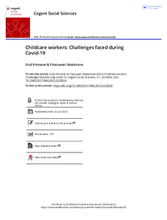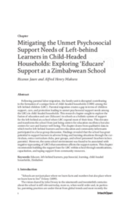Displaying 611 - 620 of 10418
This U.S.-based study explored youth experiences in residential care at different stages of adolescence.
This study explores the resilience of childcare workers in South Africa in managing the well-being of vulnerable orphans during COVID-19.
This mixed-methods study included foster parents in six mid-Southwestern states in the U.S. foster parents serve a critical role in the child welfare system; however, many report being dissatisfied with their role. As such, dissatisfied foster parents are at risk of disruption and turnover, ultimately resulting in placement moves for youth in care. Placement moves have negative impacts on youth well-being, prompting a need to explore issues related to placement longevity related to foster parent satisfaction.
The authors of this study aimed to provide more recent evidence on the population-level cumulative incidence of contacts for Aboriginal children with child protective services in Western Australia.
The objective of this webinar was to present the best practices learnt in the implementation of the foster care system as an alternative to limited child care institutions for children on the move in The Gambia.
The Ukraine Recovery Conference 2023 focussed on action to help Ukraine build back better, greener and as a more resilient and prosperous European nation. In particular, URC 2023 aimed to generate greater momentum on the role of the private sector – and the reforms required to drive investment – as essential elements for Ukraine’s long-term recovery.
Providing a safe and non-hostile environment for growth is every child's right. Need of Care and Protection (CNCP) and those in conflict with the law. This article discusses the limitations of institutional care and why there is a need to shift focus to Family-Based Alternative Care services (FBAC), especially in the context of COVID-19.
This exploratory, sequential, mixed-methods study analyses factors that enhance the provision of psychosocial support services and the perceptions of educators towards psychosocial support delivery to orphaned and vulnerable learners in Eswatini.
This research chapter sought to explore the fusion of education and care in schools in Zimbabwe as a holistic system of support for the left-behind at a school where left-behind children expend most of their time.
This World Health Organization (WHO) progress report looks back on the five years since the Nurturing care framework was launched. It documents achievements and presents areas for future action. Annotated with stories of change, the report provides a snapshot of progress in relation to each of the five strategic actions of the Framework and shows the breadth of activities that have been undertaken.






